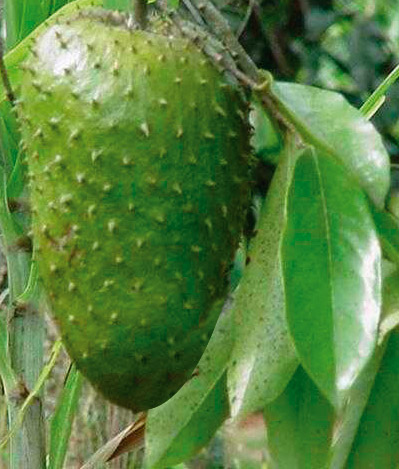
Order: Magnoliales Family: Annonaceae
Graviola (Annona muricata L.) is a member of the family of Custard apple trees called Annonaceae and a species of the genus Annona known mostly for its edible fruits Anona. All parts of the Graviola are used in natural medicine in the tropics, including the bark, leaves, roots, fruit, and fruit seeds.
Different properties and uses are attributed to the different parts of Graviola.
* Generally, the fruit and fruit juice are taken for worms and parasites, to cool fevers, to increase mother's milk after childbirth, and as an astringent for diarrhoea and dysentery.
* The crushed seeds are used against internal and external parasites, head lice, and worms.
* The bark, leaves, and roots are considered sedative, antispasmodic, hypotensive, and nervine, and a tea is made for various disorders toward those effects.
Graviola has a long, rich history of use in herbal medicine as well as a lengthy recorded indigenous use. In the Peruvian Andes, a leaf tea is used for catarrh (inflammation of mucous membranes) and the crushed seed is used to kill parasites. In the Peruvian Amazon the bark, roots, and leaves are used for diabetes and as a sedative and antispasmodic. Indigenous tribes in Guyana use a leaf and bark tea as a sedative and heart tonic. In the Brazilian Amazon a leaf tea is used for liver problems, and the oil of the leaves and unripe fruit is mixed with olive oil and used externally for neuralgia, rheumatism, and arthritis pain. In Jamaica, Haiti, and the West Indies the fruit and fruit juice is used for fevers, parasites and diarrhea; the bark or leaf is used as an antispasmodic, sedative, and nervine for heart conditions, coughs, flu, difficult childbirth, asthma, hypertension, and parasites.